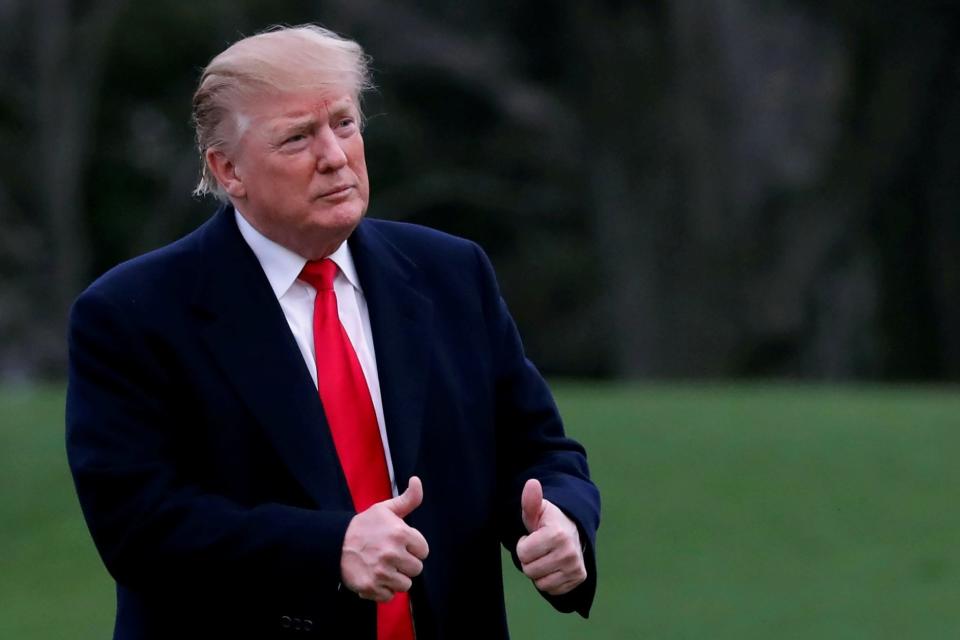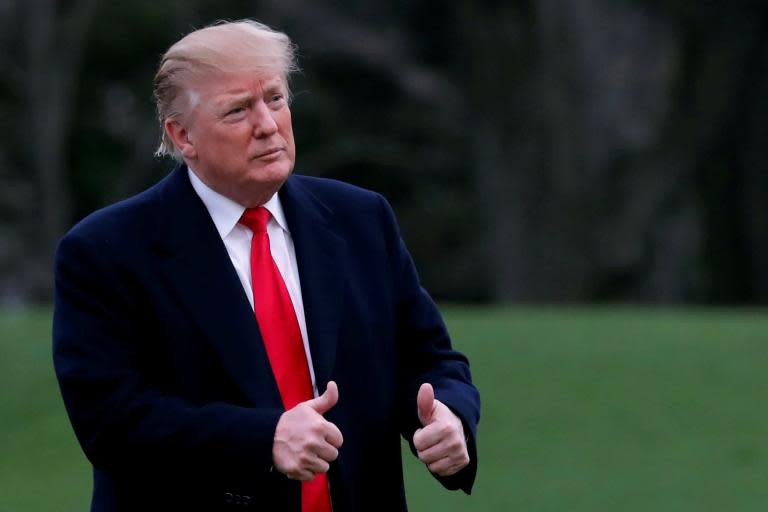Trump may be celebrating the Mueller report, but scrutiny of the president is far from over
Donald Trump has declared that he has been completely exonerated by special counsel Robert Mueller in the investigation into whether he was the Muscovian candidate for the White House in the last presidential election.
It would be fully understandable for Trump to be popping a champagne cork or three if he were a drinking man.
The conclusion that he and his team did not actively collude with the Kremlin came from an inquiry which had cast a threatening cloud since the day of his inauguration and seen his former campaign manager, national security advisor and long-term personal lawyer and consiglieri sent to prison.
There are reasons for celebration.
Trump’s critics, the number of which has steadily grown in the course of his extraordinary tenure, had hoped that the special counsel would hand what would essentially be a death sentence to what they consider a malign and toxic presidency, the worst in America’s recent history. That has not happened.
But the Mueller report is not the end of the affair. There are extremely important questions being raised about whether the president did actually try to stop the investigations into his alleged Russian links – obstruction of justice, a “high crime and misdemeanour”, which is a cause for impeachment.
There had also been the feeling for a while from those following the various investigations into Trump that Mueller would not succeed in proving Kremlin collusion, partly because the bar in doing so was always pretty high. I recall John Bolton telling me at a conference in Kiev, before he became the president’s latest national security advisor, that people near Trump “may go down” but Trump himself would survive.
Bolton has thus far been proved right. But the president is also facing scrutiny into his business affairs and the adage “they will get him on the money at the end, like they got Al Capone” has been doing the rounds.
So where do we stand now?
Mueller’s inquiry found that the Russians had indeed interfered in the election, by, for instance, hacking Democratic Party emails, and had been active in seeking to damage Hillary Clinton’s campaign.
There had been numerous confidential meetings in the run-up to the election between the most senior Trump officials, his son Donald Junior and son-in-law Jared Kushner, and Russian nationals and, the report noted, the Russians offered to help Donald Trump get elected.
Thus Trump has, indeed, been exonerated on collusion.
The other main part of the Mueller investigation was whether the president tried to stop or interfere with the inquiries into his alleged collusion with the Russians.
Here, contrary to what Trump and his supporters say, the special counsel does not exonerate the president.
“While the report does not conclude that the president committed a crime, it also does not exonerate him,” stated Mueller. It was not the special counsel’s decision not to prosecute Trump. It was attorney general William Barr who decided: “I have concluded that the evidence is not sufficient to establish that the president committed an obstruction of justice offence.”
This is now a very crucial issue. All we know so far about the report is a four-page summary from Barr. If and when full disclosure takes place remains unclear.
The Democrats and other opponents of Trump have not, so far at least, turned on Mueller, a man they had lionised as the sheriff who would clean up Trumptown.
The nearest they have come to any criticism has been Adam Schiff, the Democrat chairman of the House Intelligence Committee, questioning why the special counsel failed to interview the president face-to-face. Trump’s legal advisors had been extremely wary that he may inadvertently perjure himself in direct testimony and successfully insisted on a written Q&A.
It should be remembered, however, that James Comey, the FBI director fired by the president for failing to halt the Russia inquiry, and someone who has been showered with insults by Trump and his supporters, was once a hero to them. He gravely damaged Hillary Clinton’s presidential chances, (critically, Ms Clinton felt) by announcing he was reopening the probe into her use of emails in the last days of the race.
What is clear is that matters will not rest here. Trump and his supporters may themselves ensure that is not the case. The president’s exultation at what he sees as full vindication soon turned into talk of retribution against those who had investigated him.
“It was an illegal takedown that failed ... Hopefully somebody is going to be looking at the other side ... Complete exoneration, no collusion”, he reiterated.
Some of the president’s Republican congressional supporters had already threatened to start their own inquiries into those who had made allegations against Trump and reopen the investigation into Hilary Clinton’s emails.
Senator Lindsey Graham, once a vehement critic of Trump, now an admiring ally, announced after the release of the report that he wanted a special counsel appointed to investigate the FBI and the Justice Department over their investigation of Trump.
The Democrats, meanwhile, have reiterated that they intend to focus on their own investigations into Trump through the committees they now control through their majority in the House.
The most immediate call is for publication of the full report.
Trump had fired attorney general Jeff Sessions for recusing himself from the Russia inquiry, and thus ensuring that he was not in a position to shut it down.
The president replaced him with Barr who had publicly written, before he was appointed, that Mueller’s obstruction investigation was “fatally misconceived”.
Observers are pointing out that Barr and the deputy attorney general Rod Rosenstein had taken just 48 hours to go through the huge amount of material gathered by Mueller to decide that no prosecution was needed. The Democrats want him to appear before congress to be questioned while demanding he releases the report.
“We cannot simply rely on what may be a partisan interpretation of facts uncovered during the course of a 22-month review of possible wrongdoing by the president. The American people deserve to see the facts and judge the president’s actions for themselves,” house judiciary chairman Jerry Nadler and house oversight chairman Elijah Cummings said in a statement.
The Mueller report is not the end of the scrutiny into Trump, it is just the end of the beginning and a lot more accusations and recrimination will follow. But there is little doubt that the president, who his enemies love to hate, has had a major victory in the first round of this bitter conflict.

 Yahoo News
Yahoo News 

